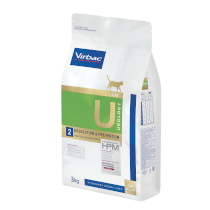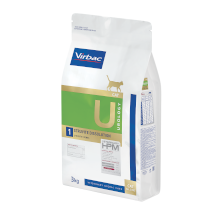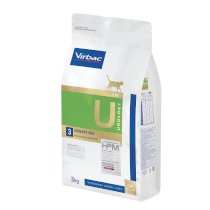Urology (Dissolution & Prevention)
Key benefits & characteristics
- Dissolution of struvites stones, reduction of struvite stone recurrence (Low Struvite RSS)
- Limit the risk of oxalate formation
- Increases water intake
- Optimises urinary pH (protein from animal origin)
- Optimal body weight control (moderate energy density)
Available sizes:
- 1,5 kg
- 3 kg
- 7 kg
Nutrion for carnivorious paragraph
Composition :
Dehydrated pork and poultry proteins, potato starch, hydrolysed pork and poultry proteins, animal fats, minerals, faba bean hulls, peas, lignocellulose, rice, beet pulp, linseed, brewers yeast, psyllium fibre (Plantago (L.) spp.), fructooligosaccharides, hydrolysed crustacean (source of chitosan), chondroitin sulfate, Lactobacillus acidophilus.
Analytical Constituents :
(% as fed)
VETERINARY HPM® contain no artificial flavor or colors.
| Constituants analytiques (% de matière brute) |
|
|---|---|
| Moisture | 5,5 % |
| Protein | 44 % |
| Animal to vegetal protein ratio | 90/10 |
| Fat | 13,5 % |
| Minerals | 7,5 % |
| Crude Fibre | 6,5 % |
| NFE * | 23 % |
| Starch | 15 % |
| Calcium | 0,7 % |
| Phosphorus | 0,7 % |
| Sodium | 1,1 % |
| Potassium | 0,7 % |
| Magnesium | 0,08 % |
| Chloride | 1,4 % |
| Sulphur | 0,7 % |
| Methionine + Cystine | 1,5 % |
| Omega-6 | 2,2 % |
| Omega-3 | 0,7 % |
| ME** calculated | 374 kcal/100g |
| ME** measured in vivo | 364 kcal/100g |
|
* Nitrogen Free Extract: Carbohydrates |
|
| Functional ingredients | |
|---|---|
| Bentonite | 0,5 % |
| Killed Lactobacillis | 7 mg/kg |
| L-carnitine | 540 mg/kg |
| Potassium Citrate | 0,3 % |
| Chitosan | 800 mg/kg |
| Vitamins and trace minerals | |
|---|---|
| Vitamin A | 17 000 IU/kg |
| Vitamin D3 | 1 700 IU/kg |
| Vitamin E | 610 mg/kg |
| Vitamin K3 | 0,22 mg/kg |
| Vitamin B1 | 11,2 mg/kg |
| Vitamin B2 | 8 mg/kg |
| Vitamin B3 | 113,4 mg/kg |
| Vitamin B5 | 14,5 mg/kg |
| Vitamin B6 | 7,6 mg/kg |
| Vitamin B8 | 0,15 mg/kg |
| Vitamine B9 | 1,9 mg/kg |
| Vitamin B12 | 0,046 mg/kg |
| Choline | 1 760 mg/kg |
| Taurine | 2 460 mg/kg |
| Copper | 12 mg/kg |
| Iodine | 0,4 mg/kg |
| Zinc | 110 mg/kg |
It is advisable to follow the ration table and make fresh water available.
Soft weight loss
| Body Weight (kg) | Daily Ration (g/day)* | ||
|---|---|---|---|
|
Overweight |
Normal* | Underweight | |
| 2 | 20 | 25 | 25 |
| 3 | 30 | 35 | 40 |
| 4 | 40 | 45 | 50 |
| 5 | 50 | 60 | 65 |
| 6 | 60 | 70 | 75 |
| 7 | 70 | 80 | 90 |
| 8 | 80 | 90 | 105 |
| 9 | 90 | 105 | 115 |
| 10 | 105 | 115 | 130 |
| *Adult dog with optimal body weight and normal physical activity
The daily ration is based on the dog’s CURRENT bodyweight, and must be adjusted every month. It is normal to notice a measured increase in water intake and urine volume. |
|||
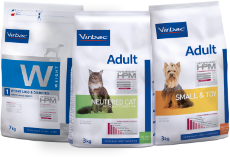
- Can I feed my kitten with a home-made diet?
The food that kittens receive throughout their first year must obviously provide energy and materials to build the skeleton, muscles, and all new tissues. But nutrition doesn't stop there: it must also help kittens develop a fully functioning nervous system and effective immune system. Any deficiency in essential nutrients (those that cannot be synthesized by the animal's body) during this delicate period may affect the cat's future health.
Many recipes developed by veterinary nutritionists are available for owners who wish to prepare a nutritionally balanced home-made diet for their kitten. However, it is illusory to succeed in meeting all the required conditions because the nutritional balance of a household ration is subject to various hazards. Owners will always find it difficult to follow the recipe exactly, the necessary ingredients are not always available, and the nutritional composition can vary considerably depending on the origin of the product. With home-made diets, no laboratory analysis can verify the nutritional composition of the raw materials used.
Therefore, even when accompanied by a mineral and vitamin supplement, home-made diets for cats often show deficiencies in several nutrients such as choline, iron, and thiamine. In addition, cats cannot synthesize vitamin D as humans do (via exposure to UV rays), so this vitamin must be provided daily in the diet. For these reasons, choosing the best adult cat food—commercially prepared with the right balance of nutrients—is a safer and more reliable option as your kitten transitions into adulthood.
- Can I feed my kitten with a vegetarian diet?
The cat is a strict carnivore, which means that certain nutrients it needs cannot be provided by a plant-based diet. Such diets can cause major nutritional deficiencies with serious health consequences. For this reason, a kitten should never be fed a vegetarian diet. Opting for premium adult cat food when the time comes ensures a nutritionally sound, meat-based formula that supports lifelong health.
- Can I feed my kitten with raw meat diets?
Raw meat diets (red meat or chicken) are very popular among certain cat breeders but raw meat diets are deficient in calcium and phosphorus. The Calcium/Phosphorus ratio is totally inappropriate for the feline species, especially in terms of bone growth. Such a diet can cause major nutritional deficiencies with serious consequences on health. For example, when fed exclusively a raw meat diet, the kitten is exposed to the risk of pathologic fractures following minor trauma.
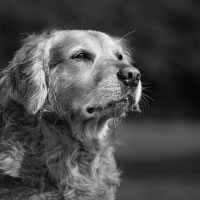
more than 6 vets out of 10 recommend our food
(source: GIE AC 2020 survey, 1519 responses)
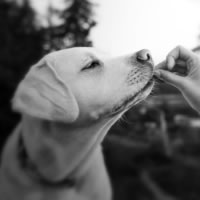
on average, our food is rated above 4/5
(source: * conso animo, shopmium, que choisir and 60 millions conso)
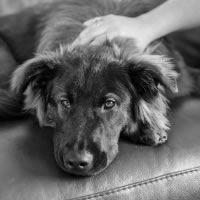
94% acceptance for medium and large dogs, 92% for small and very small dogs and 84% for cats


